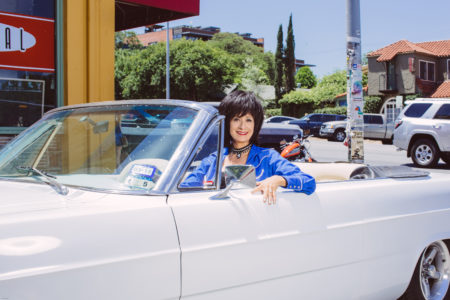With sign of slowing down, Rosie Flores is a girl with a guitar doing what she loves and wowing the crowds wherever she goes.
By John T. Davis
I really do drive that cool cat crazy
When I do my little rock ’n’ roll thing.
– Rosie Flores, His Rockin’ Little Angel
 Even for a springtime day, it was, by God, idyllic. The sky was a flawless azure blue and sun and shadow dappled the ground of the park adjacent to the Elisabet Ney Museum. The occasion was Ney Day, an outdoor party designed to fete the famed Austin sculptor and her namesake museum in Hyde Park. There were food trucks and kids with Hula-Hoops and an aerial acrobat, craft booths and picnickers. Kids of all ages, as they say. It was wholesome as all get out.
Even for a springtime day, it was, by God, idyllic. The sky was a flawless azure blue and sun and shadow dappled the ground of the park adjacent to the Elisabet Ney Museum. The occasion was Ney Day, an outdoor party designed to fete the famed Austin sculptor and her namesake museum in Hyde Park. There were food trucks and kids with Hula-Hoops and an aerial acrobat, craft booths and picnickers. Kids of all ages, as they say. It was wholesome as all get out.
And, oh yeah, and there was a makeshift stage under a big pecan tree, where Rosie Flores and her three-piece band were rocking out with Flores’ signature mixture of twangy rock, country, honky-tonk, rockabilly and Tex-Mex soul. It’s the same alchemy of beat, rhythm and groove she’s been perfecting for, well, let’s just say a long time. In this instance, it was her own You Tear Me Up. Flores bent over her customized blue electric guitar, concentrating on a solo, then twirled around like a gunslinger and tore in to another chorus. The adults clapped. The kids were agog. Even the aerialist, up on her trapeze, seemed impressed.
Cut to 24 hours later. Flores is back on stage and, yes indeed, rocking out. She was playing the Continental Club as part of a day-long tribute to the grande dame of Austin music journalists, the Austin Chronicle’s Margaret Moser.
“Wholesome” is not a word that typically bumps up against the Continental. This oldest of old-school Austin clubs sells whiskey, and lots of it. The walls are painted red and it’s the kind of joint where, when the spirit moves them, the tattooed barmaids and waitresses will hop up on the speaker stacks flanking the stage and dance the hoochie-coo.
It’s all the same to Flores. She starts off her brief set with a torrid surf/sci-fi/tremolo-drenched instrumental original called Surf Demon #5. The percussive, assertive title track to her latest album, Working Girl’s Guitar, follows, and is in turn followed by what may be her new signature song, a pounding, sinewy rocker called Little But I’m Loud.
Her turquoise-painted fingernails race up and down the guitar neck and pluck out a furious barrage of notes. The guitarists in the audience nod in unison: The girl can shred.
In the backroom adjacent to the stage, one guitarist of note is paying avid attention. Billy Gibbons of ZZ Top has dropped by to check out Flores’ set. They go way back.
“When Memphis Minnie used to play, people would say, ‘She plays just as good as a man,’ ” Gibbons says. Nodding toward the stage, he adds, “Rosie can play as good as anyone she wants. She deserves the spotlight. Austin doesn’t realize.”
 That’s not strictly true. After Flores made her latest move to the city in 2006 (in the past she’s bounced between Austin, Los Angeles and Nashville), the mayor promptly declared Rosie Flores Day. She was inducted in to the Austin Music Hall of Fame the following year, and she’s appeared on Austin City Limits and the cover of the Chronicle. She’s played probably every venue in town, from The Long Center and the Moody Theater to Ginny’s Little Longhorn (home of chicken shit bingo) and hipster dive bar The White Horse.
That’s not strictly true. After Flores made her latest move to the city in 2006 (in the past she’s bounced between Austin, Los Angeles and Nashville), the mayor promptly declared Rosie Flores Day. She was inducted in to the Austin Music Hall of Fame the following year, and she’s appeared on Austin City Limits and the cover of the Chronicle. She’s played probably every venue in town, from The Long Center and the Moody Theater to Ginny’s Little Longhorn (home of chicken shit bingo) and hipster dive bar The White Horse.
If you run in to Flores around town, unless it’s in the aisle of a health food store, she’s almost certain to be on a stage playing and singing like the dickens. It’s all she’s ever done, after all. Because here’s the thing: There’s no plan B.
Ever since forming her first rock band, an all-girl ensemble called Penelope’s Children, in high school in San Diego, Flores’ permanent professional habitat has been the stage, the recording studio and the road. Period.
She starred on her own with her country-rock band, Rosie and the Screamers, in the late ’70s, and glammed it up as a member of the in-your-face cowpunk crew the Screamin’ Sirens in the early ’80s before segueing in to the trailblazing forefront of that decade’s alt-country/new traditionalists movement right alongside Dwight Yoakam and company. She released her debut album, Rosie Flores, on Warner Bros./Reprise in 1987.
Immersed in the revived fervor for 1950s-era rockabilly that was sweeping Britain and America, she released 1995’s Rockabilly Filly and in the process reintroduced audiences to two genuine rockabilly legends who sang with her on the album: Wanda Let’s Have A Party Jackson and Janis “the female Elvis” Martin. (In 2012, Martin’s last recordings, The Blanco Sessions, would be released. Flores worked tirelessly to raise money and interest for the project and she co-produced the album).
Flores’ body of work in the 21st century, including Speed of Sound, Single Rose (a solo acoustic release), Girl of the Century and her latest, Working Girl’s Guitar, has only become more assured and diverse, and yet coherently and uniquely Flores-esque.
She’ll turn 64 on her next birthday. And she’ll celebrate it en route to a gig in New York.
“Rosie has an amazing work ethic,” says Alejandro Escovedo, who has known Flores since the Screamin’ Siren days. Flores performed in Escovedo’s play, In the Hand of the Father, and even took over his role when he took ill. “She’s one of those artists who [is]somewhat underappreciated.”
“It’s interesting I’ve hung in there so long,” she said one May morning. “Somebody who started out as a 16-year-old with a passion for music, who just wanted to put their voice out there and contribute. Now I’m 63 [but]I still feel like that 16-year-old girl.”
She’s not unique. Austin is replete with gifted female instrumentalists who have made a life in music. Flores has even teamed up with some of the best—pianist Marcia Ball, bass player Sarah Brown, drummer Lisa Pankratz and steel player Cindy Cashdollar—to perform from time to time as a pickup group called Henhouse.
But she’s unusual in that, in addition to singing and writing and fronting a band, she also plays lead guitar, traditionally the spotlight instrument in any rock band. (Rolling Stone’s 2003 list of the 100 Greatest Guitarists includes just two women). Rock ’n’ roll is still enough of a boys club that there is a stubborn but shrinking school of thought that chicks should leave aside any instrument more complicated than a tambourine.
“There are situations where male musicians find it hard to take critique or direction from a woman. I’ve seen it,” Escovedo says. “As archaic as that sounds, it’s very true. A woman like Rosie has to work harder.”
Flores, during the course of releasing 11 or so solo albums since 1987, has had the last laugh. She’s been interviewed and profiled in industry trades like Guitar Player and Guitar World. Billboard called her “a goddess,” “an adept writer and soulful singer” and “a picker who can hold her own with the best anywhere.” Rolling Stone, reviewing Escovedo’s all-star The United Sounds of Austin show earlier this year noted, “Flores…set an early high bar with her roaring vocal and sweltering guitar solo.”
For all that, she’s never achieved the renown or commercial success of, say, a Bonnie Raitt, a Joan Jett or Heart’s Nancy Wilson—all bandleaders, all lead guitarists. She hauls her own gear, she sometimes bunks with fans and friends to save on hotel rooms on the road, and sometimes, when it’s just her, she worries that maybe she’s made a mistake.
“But then I think, no, it has been working,” she says firmly. “I’ve been doing what I love. I’ve been able to sustain a living and work as an artist. I’ve never really hit the big time, but if I had never known all the people I stay with when I’m touring, I would have missed out on a lot of friends. I watched their kids grow up.
“And sometimes, people will come up to me and say, ‘We met at one of your shows and now we have four children.’ It makes me appreciate what I’ve done. Maybe I haven’t had the kind of success that Bonnie or Lucinda [Williams] have had, but I feel like this was the plan God laid out for me. Or maybe I laid it out for myself.”
Patricia Vonne, asked to describe Flores in one word, doesn’t miss a beat.
“Resilient,” she says. “This is a hard business, and she’s gotten knocked down. But she keeps going forward. She has a passion for it, she enjoys it, and that’s what keeps her going. And she’s so good at what she does.”
Vonne thinks for a moment and adds another adjective to describe her friend: “Irrepressible.”
Vonne and Flores share a small house in an un-trendy corner of South Austin. Though Vonne is musically a couple of generations removed from Flores, the two women intersect on a number of levels: Both are San Antonio homegirls, Latinas, bandleaders and songwriters. (The two have penned songs together, and Vonne co-directed one of Flores’ videos, their co-write of This Cat’s In the Doghouse.)
Though they grew up in different eras in San Antonio, their families lived not that far apart. But had Vonne known of Flores when she was growing up, the impression would have been formidable.
 “I went to an all-girls high school,” Vonne says. “And if I’d known she was out there, we would have become friends a lot earlier. [Music] was always guys, guys, guys. She would have made a huge impression on me.”
“I went to an all-girls high school,” Vonne says. “And if I’d known she was out there, we would have become friends a lot earlier. [Music] was always guys, guys, guys. She would have made a huge impression on me.”
Music was never the end-all and be-all for Vonne; she has had other career paths. But with the exception of a few ephemeral, temporary day jobs (working in a record warehouse, busing tables in a vegetarian restaurant, working as a secretary) when times were especially lean, Flores has been a lifer. Have guitar, will travel.
Though she’s played onstage at the Rock & Roll Hall of Fame and the Grand Ole Opry, hung out backstage with Bruce Springsteen (he came out to watch her play), earned a gold-standard reputation among songwriters and fellow musicians, and won a Peabody Award for her narration of a 2011 rockabilly documentary series, Whole Lotta Shakin’, the life of a woman making a life in music has its costs, not all of them financial. Decisions made in haste are sometimes repented at leisure, sometimes for decades.
Case in point: Flores moved to Nashville in 1986 with a freshly inked recording contract with Warner Bros. in her hand. Then she discovered she was pregnant. Her female manager at the time was not pleased.
“I had to make a decision about terminating a pregnancy,” Flores says quietly. “In less than 24 hours, my manager booked me in to a Planned Parenthood [clinic]. She said, ‘We just signed a new major record label. You can’t mess this up.’
“The next day, I was kind of in shock about what happened and I was trying to deal with it. Ten years later, it hit me really, really hard. It changed my mind about right-to-life situations. It taught me that nobody should ever get an abortion without some serious psychological counseling and therapeutic work. At least talk about it so you know what you’re doing 100 percent.
“I regret it now. I regret it so badly. There was one day when I was driving by the exit to the clinic and I looked over to the right and saw the empty passenger seat, and it just got me.”
Flores has never married, although she certainly doesn’t rule it out.
When she’s not practicing guitar, writing songs or prepping for the next tour, she decompresses by painting, an avocation she’s pursued ever since she was a teenager ginning out portraits of Bob Dylan and the Rolling Stones’ Brian Jones. She’d love to have a gallery show in the next year or so.
“When I moved to Austin, I started making Saturdays my painting day,” she says. “It puts me in a really happy mood, up there with my jazz singing. It’s so different and creative and fresh, almost like a falling-in-love kind of feeling.”
Whoa, back up. Did she say jazz singing? Why, yes, she did. In her seventh decade, Flores is exploring the Great American Songbook and performing with a group she calls the Blue Moon Jazz Quartet.
“I always said, ‘When I grow up I want to be a jazz singer,’ ” she says. “I loved the early songs by Nat King Cole and Sinatra, Peggy Lee and Johnny Mathis. That’s what I used to start singing. Dad would sit the tape recorder on the kitchen table when I was 6 or 7, and we’d sing songs out of the Hit Parade.”
These days, Flores is exploring jazz at the Elephant Room and the Driskill Hotel. It’s not totally unfamiliar territory; she’s already cut Billie Holiday’s Don’t Know If I’m Comin’ Or Goin’ on her 2001 Speed of Sound album.
“I can mix jazz with rockabilly,” she explains, “because everything swings.”
“Rockabilly in its true form I like jazz playing,” Escovedo notes. “You basically have to be a swing guitarist to play good rockabilly.”
In the meantime, the road is still the road. The week after we spoke, Flores was off to play the Friday night honky-tonk blues at the Luckenbach Dancehall. The next night, she was doing a solo acoustic set at Strange Brew back in Austin and a midnight band show the same day at The White Horse. The next day, she flew out to San Diego and LA for gigs. Then on to Houston, back to the Elephant Room for a jazz show and, later on in the summer, off to Spain for a rockabilly festival in Barcelona. And back home, then off once again.
Repeat as necessary for 47 years.
She thinks, maybe, if she hadn’t done this, she might have made a great teacher. She’s probably right.
“I think I would have been a great mom,” she says.
And she’s probably right about that too. She’s always tried to mentor young girls who want to tackle the intricacies of music.
For now, Austin is home, although, like a lot of people, especially artists, she worries that the rising cost of living in the city will make her a gypsy once again. If that happens, maybe she’ll try the desert. The irrepressibility that Vonne noted is always bubbling up.
“Something could take off. You never know!” she exclaims. “Maybe I’ll find the perfect gentleman and get married. I’m open to whatever the cosmos wants to hand me. I may turn in to the little bohemian artist living in the desert with two really long white braids, like Georgia O’Keeffe, painting and writing. Maybe someday I’ll be the jazz singer with the white hair with a red rose in it.”


